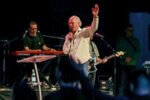CHRISTIANS ARE DIVIDED OVER WHETHER SOME RECENTLY ELECTED MEMBERS OF AUSTRIA’S GOVERNMENT ARE NEO-NAZIS IN DISGUISE
The jury is still out in Austria, where Christian leaders have different perspectives on whether the nation’s new government coalition–infused with participation by the right-wing Freedom Party–will lead to persecution of Christians and Jews.
A relatively new member of the European Union, Austria was politically boycotted by its fellow member-states recently after the inclusion of the Austrian Freedom Party in the new government coalition in Vienna sparked fears that a Nazi-like agenda could emerge as a result.
Jörg Haider, who led the Freedom Party as its chairman before he stepped down from that seat on May 1, is generally considered a right-wing extremist, or even a neo-Nazi, and the European Union said that a government with a dubious attitude toward Nazism is “morally unacceptable to Europe.”
Some church leaders in Austria view the situation differently–even positively. They told Charisma that their fellow Europeans “are behaving outrageously” by collectively branding all Austrians “Nazi sympathizers.”
Fritz Börner, president of the Evangelical Alliance in Austria, believes that Haider is a “populist–but by no means a neo-Nazi.” He adds that the “overreaction” of the European governments to the results of the last election in Austria “strengthens the Austrian right-wing.”
Börner points out that post-war Austria–by accepting big numbers of refugees from Hungary in 1956, Czechoslovakia in 1968 and Yugoslavia in the 1990s–has proved to be “unusually open and generous to suffering foreigners–hardly a Nazi attitude.”
Börner also says that the Austrian laws against Nazism “have been applied strictly.” He concludes that the Evangelical Alliance churches “respect all democratically elected governments and appeal to the world to give the new Austrian government a fair chance to prove itself.”
Charismatic leaders in Austria, as well as the president of Intercessors for Austria, pastor Erich Schindler, say there are “positive aspects” of the political change in Austria.
“For years, the Austrians have rejected change in all areas of life,” Schindler says. “Politically the Socialists have ruled for decades, and religiously
the Catholic Church has enjoyed a sort of monopoly. It is my hope that the recent political change will pave the way for a spiritual upheaval.”
Out of Austria’s 8 million inhabitants, only some 5,000 are known believers. Between 1985 and 1995 many new charismatic churches were planted, but in the last five years the growth has again decelerated. The majority of Austrians are nominally Catholic.
Most people voted for the Freedom Party, Schindler says, to protest against political corruption and the “institutionalized abuse of power.” He notes that it is “absurd to call these voters neo-Nazis.”
“It is worth noting that the people rioting in Vienna were gays and feminists fearing to lose ground without the support of the Socialist government,” he adds.
Another church leader well-respected among evangelicals and Protestant charismatics, Catholic charismatic theologian Johannes Fichtenbauer, assumes a more critical position. Fichtenbauer agrees that Haider cannot be labeled a neo-Nazi but says the skilled politician “grew up in a Nazi family.”
“I fear that he is open to the Nazi spirit,” Fichtenbauer told Charisma. The fact that Haider recently revoked some of his infamous statements praising Austria’s Nazi past does not impress Fichtenbauer.
“Haider is in it for the power, and he would say, or unsay, whatever suits his purposes,” he said.
There are “fascist-minded people all over Europe,” Fichtenbauer notes, adding that “the neo-Nazis are presently more active in both France and Sweden than in Austria.” Still, he notes that a “taboo” has been broken in post-war Europe by offering government power to the Freedom Party.
The charismatic leader suggests that in the worst case–referring to the historical role of Austria as a cradle of anti-Semitism and the birthplace of Adolf Hitler–it could be that Austria has again “loaded the gun.”
Fichtenbauer is critical of his nation’s long delay in dealing with its historical guilt as an ally of Germany in World War II. Whereas Germany in earnest relatively soon after the war undertook the task of repenting for the Holocaust, Austria viewed itself as a “victim” of Nazism or kept silent until the 1990s. Fichtenbauer sees this lack of repentance as the “spiritual root” of the success of the Austrian Freedom Party.
“If Austria had repented of its Nazi past, there would not have been any room for Jörg Haider,” he stated.
Despite his own criticisms, Fichtenbauer rejects the European Union boycott of Austria. “In the last 50 years,” he says, “Austria has a record of democratic stability that some of the other member states cannot match.”






Leave a Comment
You must be logged in to post a comment.